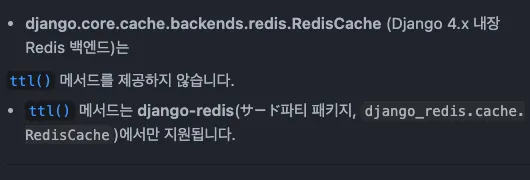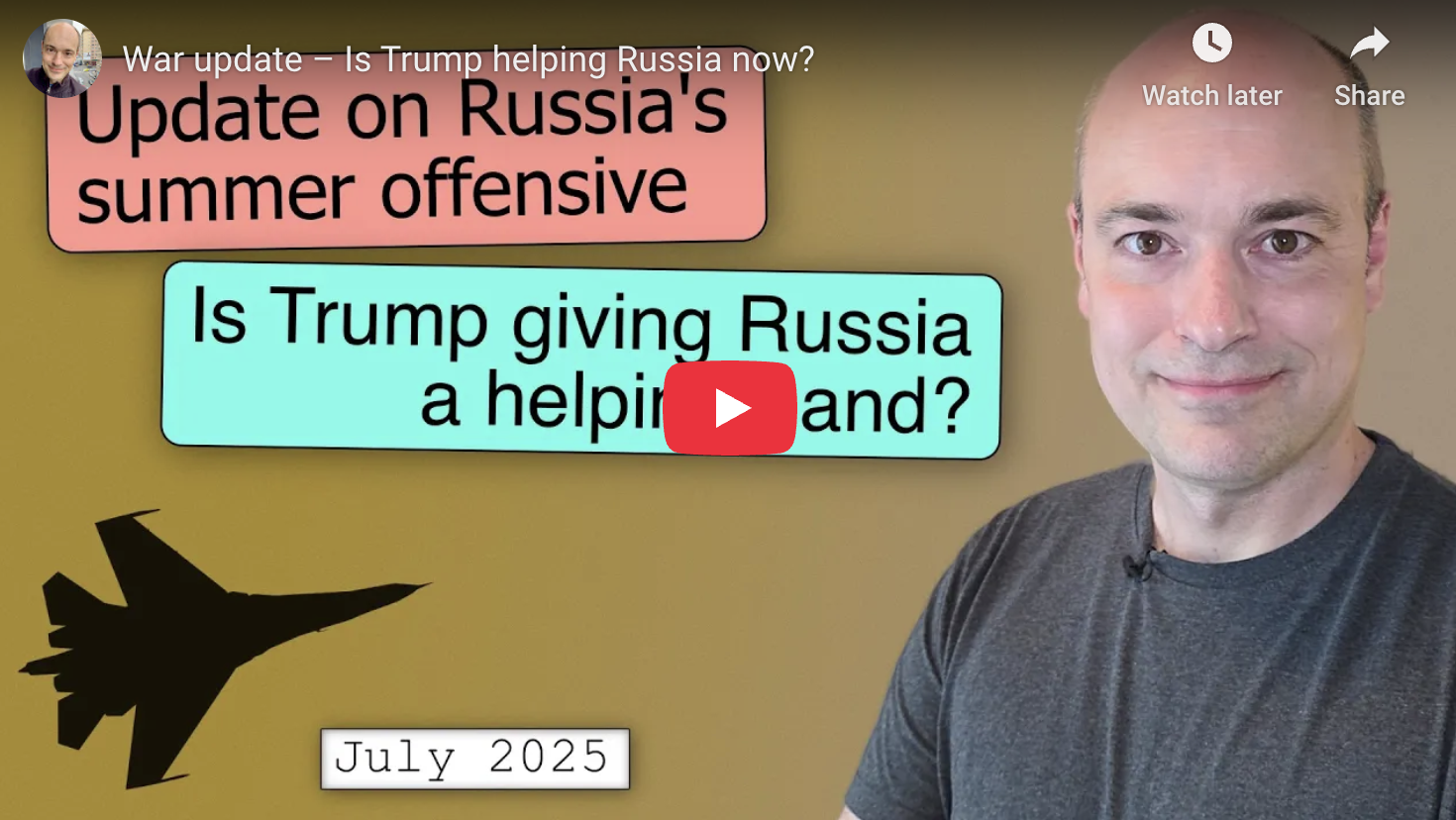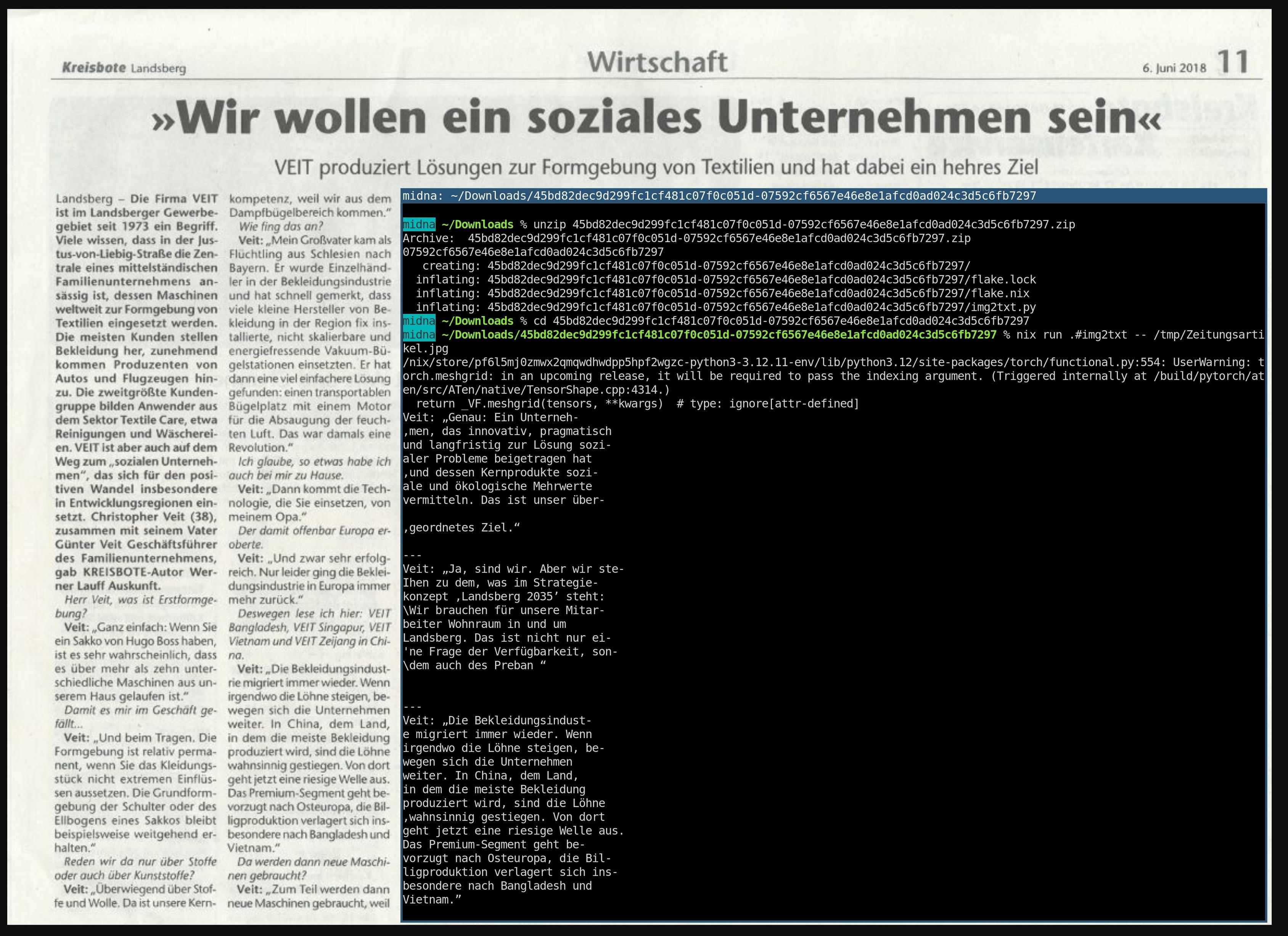Hello,
In this video, which is recorded in a tiny hotel room in rainy Amsterdam, I look at the Russian summer offensive. So far, the results have been disappointing for Russia. I also discuss the air war, which is intensifying. Both sides are able to send an increasing number of missiles and drones against each other, and Ukraine (and Russia as well) struggle with air defenses.
Finally, I touch on the American pause in the deliveries of weapons to Ukraine. The official message is that it was an arbitrary decision made by people in the Pentagon and that Trump is intent on continuing weapons deliveries, but it's difficult to tell what is truly up and down in this story. If Trump wanted to help Putin gain momentum in his summer offensive, then this is pretty much what it would look like.
Watch the video on the website or read the transcript below.
Best,
Transcript: As you can see, I am traveling, but I thought I'd do a quick update on Russia's summer offensive and how the war is going. It's been an intense period with some very important political events and also the long-range air campaigns from both Russia and Ukraine. They have stolen a lot of attention, so there hasn't been all that much coverage of how the war is progressing on the front line and what the perspectives are with Russia's summer offensive. So what I want to do in this video is to try to tie some of these things together and to give a broader picture. So, let's talk about it.
In my frontline update from June, I talked about how Russia's summer offensive has begun, and how they are pushing on several sections of the frontline to gain more territory, and also to try to break the Ukrainian defenses. I also expressed doubt that Russia would be able to significantly alter the dynamics on the frontline with this summer offensive.
What I mean by that is that it's likely that Russia will be able to take some extra square kilometers of Ukrainian territory. But when we get to the other side of the summer, the fundamental situation will be unchanged. There will still be a Russian army that is facing a Ukrainian army, and both armies will still be standing. And also, while Russia probably will be able to take some Ukrainian territory in the open countryside, they will run into problems when when they come to the Ukrainian cities. And therefore, it will be limited how much territory that can actually change hands.
Essentially, that is what we see playing out now. Russia is making a bit of progress in certain areas of the front line, but it doesn't seem to be all that dramatic. The overall picture is that the Russians are struggling to make progress.
In the Sumy region in the north, there was concern that the Russians could get within artillery and FPV range of the city. This could mean that the Russians could start destroying the city and targeting the civilians that live there. But the Russian progress has more or less been stalled. The Sumy offensive has gone pretty much the same way the Kharkiv offensive did last year. The Russians advanced a couple of kilometers across the border, and then they were stopped by Ukrainian forces.
The biggest Russian push is in the Donetsk region, especially around the city of Pokrovsk. But also here, it's not really that dramatic, what we've seen in terms of territory that changes hands. Russia has advanced a bit here and there, but it's not significantly changed the situation. It looks like it will be difficult for them to take some of the big cities that they are approaching, such as Pokrovsk or Konstantinivka. Maybe they will be able to take Chasiv Yar. We will see.
I think it's too early to disregard the Russian summer offensive and to say that this is not working. We're not even halfway through the summer and a lot of things can still happen. But I will say that if you work in the Russian general staff and you look at what you've achieved so far, I think it would be very difficult to be satisfied with the results. This is clearly disappointing from a Russian point of view. So it looks like Ukraine has things pretty well under control in the defensive fight along the frontline.
Then there is the air war. That's the long-range air campaign that both sides are waging on each other. Here we see a continuation of the trend towards bigger and bigger airstrikes. Both sides are able to leverage a larger number of drones and missiles against each other. And it looks like these airstrikes are just becoming more and more successful.
So the intensification of the air war is continuing. The Russian airstrikes on Ukrainian cities and especially on Kyiv, have been covered a lot in the news. These airstrikes have been the worst of the entire war. Several times over the last month, the Russians have broken the record for how many missiles and drones they can launch on Ukraine simultaneously. This number is now well over 500, and it's approaching 600. And it's not unlikely that before the summer is over, we will see 1,000 drones and missiles at the same time. So it's very intense.
I think there are two things at play here. On the one hand, Russia has been able to increase the production of drones and missiles, which allows them to fire a larger number on Ukraine simultaneously. And the other thing is that Ukraine is really struggling to keep up with air defenses. And in particular, it's some of the more sophisticated systems such as Patriot, where the deliveries have really slowed down.
One of the questions that I get asked a lot is about the connection between these airstrikes on Ukrainian cities and the frontline situation and whether one can actually win the war by having success in long-range airstrikes.
The answer to that is that it depends. It depends on what you're hitting. Essentially, you can have two approaches. One is to try to terrorize the population into surrender. So this approach has been tried many times in the history of air power. It's been one of the original ideas since the invention of the airplane that you can use this capability to make life miserable for the population and then eventually they will probably surrender.
If you do that, you probably won't win the war. There is very little evidence that terror bombardments actually work as intended. On the contrary, they tend to reinforce the hatred even more and to galvanize the population in the fight against the aggressor.
But the other approach is that you can use long-range strikes to hit the enemy's production facilities and the logistics. And if you do that, then it can have decisive impact on the war.
The stereotypical understanding of the air war that is going on in Ukraine is that Russia is following a strategy of terror bombardments and that Ukraine is trying to be more strategic about targeting production facilities and Russia's war economy. But the reality is that it's more nuanced than that. I think it's difficult from the outside to have a clear picture of how Russia is actually using their long-range airstrikes to hit Ukraine.
The Ukrainians are very cautious about discussing when Russia hits their production facilities. And that's because they don't want to provide information that the Russians can use for battle damage assessment. And also, they just kind of like to reinforce the image of the Russians only targeting civilians.
But it's not clear cut like that. It's not only one or the other. Some of the Russian airstrikes are indeed directed towards the cities and to try to terrorize the population. But they also target Ukrainian production facilities and logistics and military installations.
So the way I would put it is that the airstrikes from both sides have an impact on the war and the front line as a whole. The Ukrainian airstrikes, percentage-wise, will probably have a bigger impact because they don't waste their bombs and missiles and drones on bombing civilians. Instead, they try to pick out the targets more cleverly and to hit those things where it actually makes a difference. However, a significant portion of the Russian missiles also do that. So it's difficult from the outside to say which has the bigger impact, the Russian or the Ukrainian campaign.
And that leads me to the last thing I want to cover in this video, which is the fact that the United States has, again, stopped the deliveries of weapons to Ukraine. It has been difficult to figure out exactly why. Why is this happening? What's going on? How much of this is intentional? Or how much is it just because the American administration doesn't really know what they're doing?
Because on the one hand, over the last month, Donald Trump has been, in his rhetoric, actually more supportive of Ukraine and he has been more critical of Russia. So he's been saying things that would indicate that the United States would increase the support for Ukraine and deliver more weapons. But then, on the other hand, we suddenly have the news that the Pentagon has stopped the deliveries of weapons to Ukraine because they have to do some kind of big assessment of the impact on the readiness of the American military by giving all these weapons to Ukraine.
And excuse my French, but that's a total BS excuse because the United States is not providing more to Ukraine than they are producing. If the U.S. military gives something that they have from their own stockpiles, then the money is allocated to buy new weapons so that the U.S. military can replace them.
So, the American decision to stop the weapons deliveries is entirely political, and it includes a range of air defense systems that are crucial for Ukraine to defend itself against the increasingly intensive Russian airstrikes.
So as I said, it's difficult to understand what's going on in American policy right now and who is making what decisions and why. It's possible that this is just a misunderstanding and that soon things will change and the Americans will provide those air defense weapons to Ukraine again.
But I do want to say this: if you are an American president who sympathizes with Russia and you would like Russia to have more success in their summer offensive, then this is exactly what you would do. You would stop the deliveries of weapons to Ukraine while at the same time going around talking about how you want to deliver more weapons to Ukraine and promise that these are just around the corner. That way everyone else is pacified in a waiting position because they're going around hoping that you're going to deliver on those promises any moment now.
If you were open about stopping weapons deliveries to Ukraine and you make it clear that this this is the policy, then that could incentivize someone else to take some initiative. And that's not what you would want to see. You would want everyone else to stay passive and to just wait. And that's why you would walk this line of saying one thing while in practice doing the exact opposite.
And I'm not saying that this is what Donald Trump is doing, because I don't know that. But what I am saying is that if Donald Trump wanted to give Putin a helping hand with his summer offensive, then this is exactly what it would look like. And I think it's important that European politicians keep that in mind.
OK, I will end it here. If you found the video helpful or informative, then please give it a like. And also remember to subscribe to the channel and click the bell icon to get notifications when I upload new videos. If you want to support the channel and also get access to some bonus videos, you can subscribe to my newsletter on www.logicofwar.com. Thank you very much for watching, and I will see you again next time.




 一般 Kyungmi Ahn ꉂꉂ(ᴖᗜᴖ*)
一般 Kyungmi Ahn ꉂꉂ(ᴖᗜᴖ*) 


 くろでん
くろでん







 서버메이드 깐프
서버메이드 깐프 



